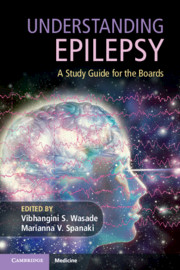Book contents
- Understanding Epilepsy
- Understanding Epilepsy
- Copyright page
- Dedication
- Contents
- Contributors
- Preface
- Chapter 1 Pathophysiology of Epilepsy
- Chapter 2 Physiologic Basis of Epileptic EEG Patterns
- Chapter 3 Pathology of the Epilepsies
- Chapter 4 Classifications of Seizures and Epilepsies
- Chapter 5 Electro-clinical Syndromes and Epilepsies in the Neonatal Period, Infancy, and Childhood
- Chapter 6 Familial Electro-clinical Syndromes and Epilepsies in Adolescence to Adulthood
- Chapter 7 Distinctive Constellations and Other Epilepsies
- Chapter 8 Seizures Not Diagnosed as Epilepsy
- Chapter 9 Nonepileptic Spells
- Chapter 10 Status Epilepticus
- Chapter 11 EEG Instrumentation and Basics
- Chapter 12 Interpreting the Normal Electroencephalogram of an Adult
- Chapter 13 Ictal and Interictal Epileptiform Electroencephalogram Patterns
- Chapter 14 Neonatal and Pediatric Electroencephalogram
- Chapter 15 Scalp Video-EEG Monitoring
- Chapter 16 Intracranial EEG Monitoring
- Chapter 17 Neuroimaging in Epilepsy
- Chapter 18 The Role of Neuropsychology in Epilepsy Surgery
- Chapter 19 Principles of Antiseizure Drug Management
- Chapter 20 Gender Issues in Epilepsy
- Chapter 21 Antiseizure Drugs
- Chapter 22 Surgical Therapies for Epilepsy
- Chapter 23 Stimulation Therapies for Epilepsy
- Chapter 24 Practical and Psychosocial Considerations in Epilepsy Management
- Chapter 25 Comorbidities with Epilepsy
- Chapter 26 System-Based Issues in Epilepsy
- Index
- References
Chapter 18 - The Role of Neuropsychology in Epilepsy Surgery
Published online by Cambridge University Press: 11 October 2019
- Understanding Epilepsy
- Understanding Epilepsy
- Copyright page
- Dedication
- Contents
- Contributors
- Preface
- Chapter 1 Pathophysiology of Epilepsy
- Chapter 2 Physiologic Basis of Epileptic EEG Patterns
- Chapter 3 Pathology of the Epilepsies
- Chapter 4 Classifications of Seizures and Epilepsies
- Chapter 5 Electro-clinical Syndromes and Epilepsies in the Neonatal Period, Infancy, and Childhood
- Chapter 6 Familial Electro-clinical Syndromes and Epilepsies in Adolescence to Adulthood
- Chapter 7 Distinctive Constellations and Other Epilepsies
- Chapter 8 Seizures Not Diagnosed as Epilepsy
- Chapter 9 Nonepileptic Spells
- Chapter 10 Status Epilepticus
- Chapter 11 EEG Instrumentation and Basics
- Chapter 12 Interpreting the Normal Electroencephalogram of an Adult
- Chapter 13 Ictal and Interictal Epileptiform Electroencephalogram Patterns
- Chapter 14 Neonatal and Pediatric Electroencephalogram
- Chapter 15 Scalp Video-EEG Monitoring
- Chapter 16 Intracranial EEG Monitoring
- Chapter 17 Neuroimaging in Epilepsy
- Chapter 18 The Role of Neuropsychology in Epilepsy Surgery
- Chapter 19 Principles of Antiseizure Drug Management
- Chapter 20 Gender Issues in Epilepsy
- Chapter 21 Antiseizure Drugs
- Chapter 22 Surgical Therapies for Epilepsy
- Chapter 23 Stimulation Therapies for Epilepsy
- Chapter 24 Practical and Psychosocial Considerations in Epilepsy Management
- Chapter 25 Comorbidities with Epilepsy
- Chapter 26 System-Based Issues in Epilepsy
- Index
- References
Summary
Broadly speaking, clinical neuropsychology is an applied science concerned with the behavioral expression of brain dysfunction. A thorough clinical interview aimed at understanding previous and current functioning, as well as current factors that may influence the patient’s performance on testing, is the foundation of a neuropsychological evaluation.1 Comprehensive neuropsychological assessments aim to identify the patient’s cognitive strengths and weaknesses, as well as to evaluate the status of overall brain function, different brain regions, and networks. Although there is no standard neuropsychological test battery, the following domains are typically assessed: performance validity, premorbid and intellectual functioning, attention and working memory, processing speed, language abilities, visuospatial skills, verbal and nonverbal learning and memory, executive functioning, and motor abilities. Objective measures of personality and affective functioning are also commonly administered.
- Type
- Chapter
- Information
- Understanding EpilepsyA Study Guide for the Boards, pp. 346 - 356Publisher: Cambridge University PressPrint publication year: 2019
References
- 1
- Cited by



